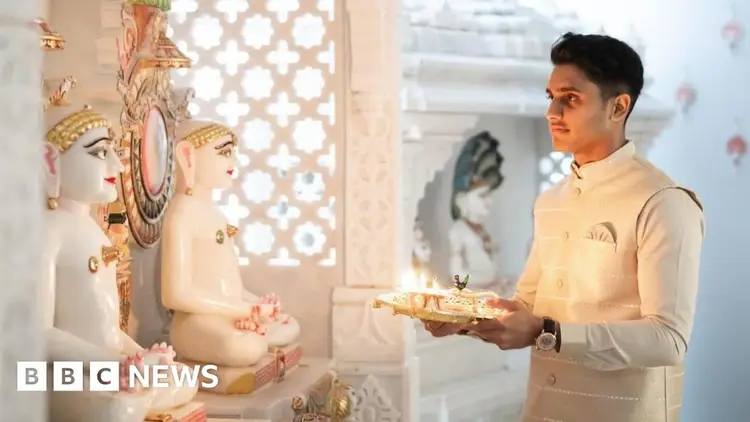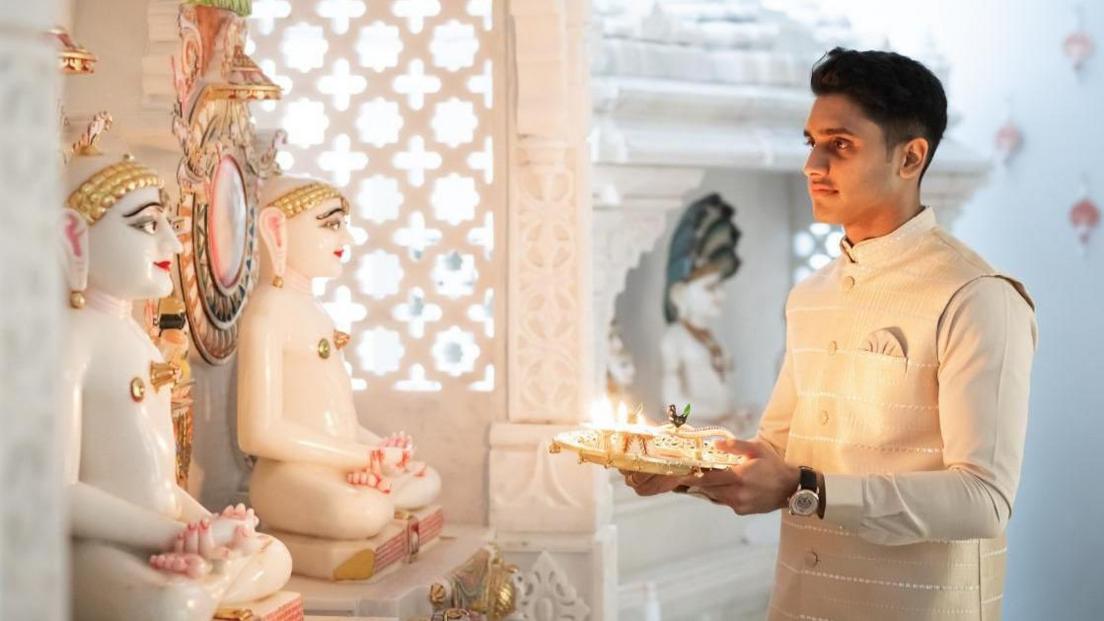'Diwali is more than fireworks, it's about gratefulness'

"Diwali: Beyond Fireworks And Sweets"
Photo credit: Anil Photography
The date of Diwali changes every year based on the lunar calendar.

Diwali involves much more than simply setting off fireworks, indulging in Indian desserts, and illuminating lamps.
Four different religions observe the occasion in their own unique ways, each with distinct reasons for their celebrations.
Hindus and Jains observe Diwali on October 31, while Sikhs celebrate it on November 1, and Buddhists commemorate it on November 15.
Individuals from various religions across London share with the BBC their personal interpretations of what Diwali signifies for them.
"Favorite Season Of The Year"
Photo credit: Vedika Apte
Hindus observe Diwali over the course of five days.
"It's truly one of my favorite seasons," says 23-year-old Vedika Apte from west London.
The medical student has been busy the last few days preparing ladoos, which are round Indian sweets, alongside her mother.
"We'll still be enjoying them in two weeks," she remarks, but that's only the beginning of the celebrations.
Hindu communities throughout India each have their own unique ways of celebrating Diwali, and Vedika shares that her traditions are based on the Marathi customs.
In addition to enjoying time with loved ones, dancing, and lighting candles, Vedika views this season as a moment to appreciate all that surrounds us, as well as to express gratitude to God.
Image credit: Vedika Apte
A laddoo is a round Indian dessert crafted from flour, sugar, and butter.
"It's more than just dazzling displays," she mentions while describing the first day of the five-day celebration, known as Dhanteras. On this day, individuals purchase gold and other metals, as it is thought to attract prosperity and good fortune into their households.
On the second day, known as Narka Chaturdashi, Vedika's family started their morning by applying oils and sandalwood powder. This ritual is believed to "get the body ready for the colder months" according to traditional practices.
Her family also tidies up and arranges their home to prepare for the arrival of the goddess of wealth, Lakshmi, the following day.
On the third day, Hindus celebrate by lighting lamps and setting off fireworks. They also take a moment to pray for blessings, abundance, and well-being for their families, the wider community, and the greater good of all.
The fourth day is referred to as "couples' day," when wives pray for the long life of their husbands, and in exchange, they receive a gift. On the last day, sisters offer prayers for their brothers, who then give a present and vow to take care of their siblings.
"A Moment For Reflection And Introspection"
Photo credit: Anil Photography
The primary goal for Jains is to achieve "moksha," or liberation.
Dev, a 19-year-old Jain from North London, shares that Diwali is a time for enhancing one's spirituality and connecting more deeply with oneself.
For Jains, this two-day celebration commemorates the moment when Lord Mahavira, the founder of Jainism, attained Moksha, which signifies a state of everlasting happiness.
Diwali isn't just about feasting, drinking, or having fun. It's a time for personal reflection and self-awareness, encouraging you to look within, examine your actions, and connect with your inner self.
During this period, Dev also engages in fasting to purify his body and eliminate toxins in preparation for prayers and rituals. He believes this practice aids in achieving spiritual liberation and escaping the cycle of rebirth.
"We refrain from using firecrackers since they can harm the souls around us. Instead, we choose to light lamps."
Photo credit: Anil Photography
Rangooli is an art form that involves creating designs using vibrant colored powders.
Photo credit: Beant Dhillon
Sikhs frequently gather at the gurudwara to engage in prayer as part of their celebrations.
"I used to visit my grandma's house to lend a hand in preparing fresh samosas, spring rolls, and gulab jamuns," shared Beant Dhillion, a trainee solicitor hailing from east London.
He now emphasizes that Diwali is an opportunity to truly consider the lessons and significance of the celebration that takes place each year.
The Sikh celebration called Bandi Chhor Divas commemorates the freedom of the sixth guru, Hargobind Sahib, along with 52 Hindu princes who were unjustly detained in 1619.
"It highlights the groundbreaking nature of Sikhism and emphasizes the triumph of righteousness over wrongdoing."
"Let's Appreciate Nature Now"
Photo credit: Venerable Phramaha Bhatsakorn Piyobhaso
Buddhists present gifts as a way to seek forgiveness in their prayers.
Venerable Phramaha Bhatsakorn Piyobhaso, a Thai Buddhist residing in south-west London, takes part in the celebration of Loy Krathong, a festival dedicated to paying respect to the water goddess, Phra Mae Khongkha.
In the chilly winter season, Venerable mentioned that the festival represents a decision "to acknowledge that we can endure."
"It's a moment to rejoice, express gratitude to the natural world, and seek forgiveness," he notes, emphasizing that this season is an important opportunity to "integrate Buddhist principles into our daily lives."
Photo credit: Venerable Phramaha Bhatsakorn Piyobhaso
Buddhists observe the festival of Loy Krathong to pay tribute to the water goddess, Phra Mae Khongkha.
Some Buddhists honor the occasion by creating krathongs, which are typically crafted from banana leaves and designed to resemble small boats.
Items like candles and incense sticks are placed inside and then set afloat on rivers to honor the Buddha's footprints and acknowledge his presence on Earth.
After that, the afternoon is filled with enjoying food, dancing, singing, and showcasing cultural performances.
The festivities take place during the full moon in the twelfth month of the Thai lunar calendar, which falls on November 10th.
Tune in to top programs from BBC Radio London on Sounds, and keep up with BBC London on Facebook, X, and Instagram. Feel free to share your story suggestions by emailing [email protected].





















































